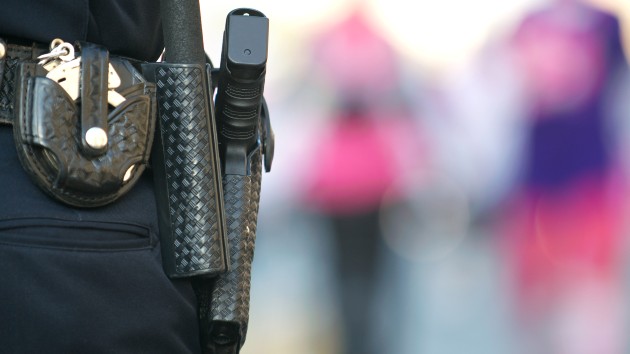
dlewis33/iStock(NEW YORK) — At the end of an hour-long phone call with White House and Homeland Security officials, a police chief from outside San Francisco made a stark plea: “Stop testing NBA players, and start testing our first responders.”
The appeal came during a call on Friday organized by the International Association of Chiefs of Police in order to provide police departments with information “to get through this crisis OK,” Dr. Alex Eastman of the Dallas Police Department said on the call.
A New Jersey State Police official expressed concern that federal privacy laws were masking the exact locations of confirmed coronavirus cases in his state, endangering officers and citizens there.
“We’ve already had a case where a positive test was out breaking the quarantine, driving around with just a mask on, in their car,” he warned on the call, worried that his officers won’t be able to take proper precautions without knowing more about where cases have been confirmed.
Chief John Carli of Vacaville, California, said he had to rely on “back channels” at a local hospital to procure tests for officers possibly exposed to the deadly disease.
“Somebody needs to make a decision at the very high level so that we’re not having to have these decisions made [this way],” he insisted to Trump administration officials on the call, which was recorded and reviewed by ABC News.
As the coronavirus crisis deepens, Friday’s call reflected how police departments across the country are struggling to keep their agencies — and their communities — intact.
It also illustrated, in sometimes explicit terms, how drastically policing in America has been altered in such a short period of time.
“Our mission has completely changed from what we were doing three weeks ago,” Bill Brooks, police chief in Norwood, Massachusetts, said on the call. “Our core mission at this point is not only public service but sustainability. I need the police department to be operational and healthy 60 days from now.”
Under the grip of the coronavirus, police departments and other law enforcement agencies have lost significant portions of their workforce to quarantine, self-isolation and confirmed sickness. At the Department of Homeland Security alone, “several thousand” employees have been sidelined in recent weeks, a senior DHS official disclosed on the call.
“If we’re quarantining [our] people for 14 days … we’re going to lose our first responders,” Carli warned. “And we have to, at a national level, get the support down to the local level. Stop testing NBA players, and start testing our first responders.”
He was referring to the 13 professional basketball players who reportedly have already tested positive for coronavirus. In at least some of those cases, it was reportedly state officials — not federal officials — who determined tests were warranted.
But Dr. Eastman of the Dallas Police noted on the call that many officers “are clamoring” to be tested when their risk of exposure is actually quite low.
In fact, Eastman said, in his area only about one out of every 10 police officers possibly exposed to coronavirus actually needs to be tested.
Meanwhile, routine traffic stops — and those ubiquitous police requests for “license and registration” — have become almost obsolete.
“We really told our people not to do traffic enforcement at all,” Brooks said on the call.
In many parts of the country, officers have even been ordered to avoid arresting people “if it all possible,” even as they are “still responding full speed ahead” to the most violent crimes and matters of life and death, according to the police chiefs.
And patrol officers are now paying close attention to grocery stores, where tensions have flared over “hoarding scenarios,” and to businesses ordered closed by mayors or governors, the chiefs said.
The chiefs were advised that the U.S. Supreme Court is unlikely to interfere with any efforts to enforce curfews, quarantines or “mandated social distancing” — as unpopular as those moves may be.
“We’re in unprecedented times,” an attorney on the call told them. “[But] the Supreme Court is … not going to get involved in overturning local or state decision in this matter, unless the Constitution is being violated and that violation is something that is not reasonable.”
Brooks noted that police are going to face “the ultimate dichotomy.”
“We will be asked to enforce orders but not make physical arrests,” he said. “And it will come down to the amazing skills of cops to make that happen.”
On the call, the police official from New Jersey, where a coronavirus patient allegedly abandoned home quarantine, worried that health authorities are not telling law enforcement agencies where confirmed coronavirus patients live.
That is preventing police from taking appropriate precautions, and “the excuse is HIPAA,” he said, referring to the Health Insurance Portability and Accountability Act, which strictly limits the sharing of personal health information.
In response, an official from North Carolina explained how, just a week ago, law enforcement agencies and local health officials in his state created a secure system to flag police departments when new confirmed cases pop up in their jurisdictions, without widely disseminating any names.
“That so far has been effective … without trying to violate HIPPA or give us too much information,” the official said.
“There’s going to be a rough few weeks, maybe [even] a couple of months,” Eastman said. “But we’re going to get through this.”
A recording of Friday’s call was posted to a coronavirus-related page on IACP’s website.
Copyright © 2020, ABC Audio. All rights reserved.
